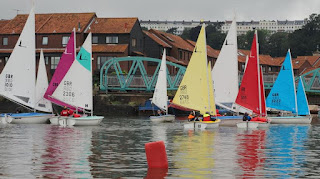If you head to the West Coast of Scotland, you are surely in for the one of the greatest sailing surprises in your life afloat. From Stranraer in the Dumfries and Galloway to Durness on the north western tip of the Highlands, you arguably have all that you could ever possibly want from a boating life.
Yes, you can probably leave sunblock off the shopping list. Yes, you’ll need decent sailing boots and be advised to take the kind of foul weather gear that Captain Scott would probably think was overdoing it for a winter in the Arctic. And yes, you’ll need to have a basic understanding of messing about in boats because these are deep waters and it can windy. But don’t hold back, because quite simply, you’re in for a majestic, unfathomably good experience.
Among the glorious shores of these islands, there is one of the best-kept secrets of sailing.
It’s a ragged and rocky coastline that is blessed with the sort of idyllic, empty sandy beaches stretching on for miles that would make Tom Hanks's castaway shake from method acting-induced PTSD. Here the blue waters are scattered with islands rising from the depths with the kind of muscular topography that would have your average geography teacher reaching for their colouring-in pencils.
This, my friends, is the west coast of Scotland.
Forget the Caribbean, wonderful though the punch, the people and the terribly reliable temperature all are. The untouched beaches of the Western Isles are every bit as beautiful, just permanently 15 degrees Celsius colder.
Ignore the Mediterranean, with it barren sandy waters, overfished to within an inch of its life since the Augustine and overrun with Frenchman fighting over marina spaces.
Because here’s the secret. If you head to the West Coast of Scotland, you are surely in for the one of the greatest sailing surprises in your life afloat. From Stranraer in the Dumfries and Galloway to Durness on the north western tip of the Highlands, you arguably have all that you could ever possibly want from a boating life.
From the picturesque port of Oban in Argyll and Bute, to the distant shores of Harris in the Outer Hebrides, by way of islets dotting the sea with names like Canna, Tiree or the towering slab of Staffa, famed for its Fingal’s Cave, you will find yourself in a water wonderland that feels positively Jurassic, geologically speaking.
Anchor for the night in Loch Aline off the Sound of Mull, where you can be the only boat, and you can wake up for swim in the morning before dipping your hook in for a mackerel or two. You’ll then have their peppered fillets twitching in the melting butter of your pan for a breakfast of the gods. You can have eggs any-which way you want them, followed by the most stupendous banquet of ornamentally dissected tropical fruits while having your head massaged in the Four Seasons in the Maldives with hammerhead sharks mating beneath your plate glass floor. Good luck to you. I’ll take fresh buttered mackerel on toast, with the sun rising over a loch in the Western Isles, in the shadow of a munro, under a Sisley sky of pale blue that doesn’t stop till it reaches the Moon.
And then there’s the wildlife; the basking shark you’ll see as your cross the Little Minch from Skye to the Outer Hebrides, or the school of dolpin that will dance around your bows with glee for an hour without cease, or the seals bobbing in the lochs.
Bask in the Mediterranean sun all you want, but there’s nothing like drawing level with a basking shark.
Yet there is more to celebrate: when you’re ashore you won’t be assailed by marching bands of vernacular musicians like you would in the Aegean, sonorous for a night or two though they are. Moreover it is hard to tire of haggis or langoustine or mussels freshly harvested. These crustacean are the evolutionary destination of lemon and sauvignon blanc. And then there are distillery tours, so perfect for getting your land legs back.
There are a few simple rules, of course: have respect for dreaded Corryvrekin; don’t slow down for a whirlpool, avoid the rocks, and keep plenty of fuel in the tank just in case. Oh yes, and steer clear of the fisherman, and the ferries which travel faster than you’d think. Do all that, and you can do your best to eat the mackerel to extinction, and spend happy days sailing between islands named Rum or Canna, or Benbecula, Uist or Lewis, of course, where you can head ashore and visit the Callanish Stones or stroll out to see the Atlantic in all its fearful glory. And from the Outer Hebrides you could even set forth into the Atlantic and make for St Kilda, evacuated in 1930 and now the home of puffins and gannets.
Forget the pirates of the Caribbean, be a primate of the West coast of Scotland. It’s what boats are built for. The Vikings knew it and so should we all.













